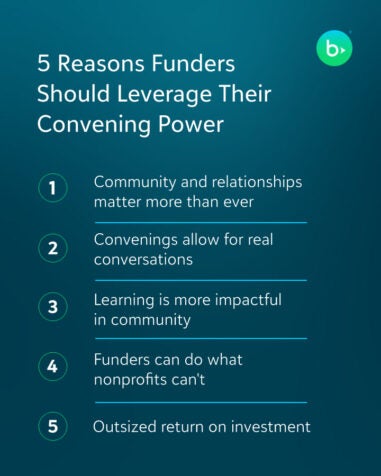5 Reasons Funders Should Exercise Their Convening Power to Meet this Moment

As funders, it’s hard to know how best to use limited resources to best benefit your communities, grantees, and issue areas when there are so many equally valid ways of doing this work. Though there are thousands of tools at your disposal as a funder, there’s one that I loved using when I was a federal funder at the Department of State: our power to convene.
I’m fully aware that not all funders have the name recognition of the U.S. government, but as someone who has spent my whole career in various roles in civil society—within nonprofits, as a funder, and now as a capacity-building consultant—I guarantee that to your grantees and the larger community, your name as a funder carries a lot of weight. It’s the job of nonprofit leaders to understand who their funders and potential funders are, and as a result, if you extend an invitation, folks are likely to want to engage.
Convening is a power and a privilege that I want more funders to be aware of, and to feel comfortable using for the benefit of your goals, your grantees, and the larger communities in which you operate. In this blog post, I’ll outline five reasons why leveraging your convening power is essential for funders, especially now. So, let’s dive in.

1. Community and relationships matter more than ever.
Times are hard for nonprofits in the United States, and the political and fundraising context can be incredibly difficult for folks to navigate right now. People are feeling siloed and isolated, and scarcity doesn’t help foster warmth and collaboration when organizations are forced to compete for smaller pots of funding overall.
But we all know that the work is stronger and more impactful when organizations and communities are communicating and collaborating. Right now, nonprofits are crunched for funds and are saving what they do have for work that is both urgent and important, leaving important but not necessarily urgent tasks for later. That means any convenings that they may have paid for in the past are the first things to get struck from the budget.
More often than not, funders like you have the funds, the space, the relationships, and the weight of community respect at your disposal, and that’s why I think you’re well-placed in the ecosystem of civil society to step up into the breach and provide the space—both theoretical and concretely physical—for community and relationships to flourish at a time when these person-to-person ties have never been more important.
2. Convenings allow for real conversations around strategy, collaboration, and even productive conflict.
I studied organizational psychology as an undergraduate at Harvard College, and have always found the research around how groups work together to be among the most interesting in all of science. In fact, that’s why so much of Capacita’s work with nonprofits and funders focuses on bringing organizational psychology’s findings on high-performing teams to the people out here every day trying to make the world a better place (in other words, to all of you reading this right now)!
Many peer-reviewed studies have found that group problem solving and conflict are better handled in person. When planned with emotional intelligence, care, and strategy, funders can convene grantees or their wider community for honest, impactful conversations about collaboration, gaps, or meaningful changes in collective approaches that can ultimately remake movements, serve as force multipliers, or behave as metaphorical embers that light fires for lasting change.
3. Learning is so much more impactful in community and with peers.
Moving beyond convenings that tackle strategy, I’d like to highlight convenings that have learning and development at their core. These types of convenings might look like learning-focused cohorts for nonprofit leaders, or one-off trainings for people with discrete, crucial roles within organizations (like fundraisers, community organizers, or communications staff), or some combination of both.
We love leading capacity-building trainings and workshops, and we also work with—and within—longer-term cohorts all the time at Capacita. We have seen firsthand how impactful it can be when funders set aside a relatively small amount of funding to develop the skills and capacity of their grantees. This also allows them to build relationships and a sense of community among the people doing this work in different, though often complimentary, organizations. It’s such a great way to enable internal investment in people and organizations that often don’t have the extra budgetary breathing room to do so themselves, especially right now.
4. Funders can do what nonprofits can’t.
Ok, let’s get real for a second. There are politics (note the small “p” there. I’m not talking about Democrats and Republicans) between organizations that work on similar issues or in the same place, and that’s ok! I’d go as far as to say it’s normal and relatively inevitable.
But politics between grantees can mean that there are unhelpful dynamics at play when one nonprofit acts as a convener and tries to host or call for gatherings to discuss collaboration, strategy, or conflict that are far less problematic—or disappear completely—when a funder is the convener instead. This is what I mean when I say that this convening ability is a power, or even a privilege, that funders have and which nonprofits can’t really replicate for themselves. It’s worth thinking about how you can exercise this power in a way that helps everyone.
5. Outsized return on investment and lots of impact for a comparatively low cost.
I have left my favorite point for last. The best part about convenings is that even one thoughtful, well-executed convening can:
- Strengthen grantee networks
- Deepen funder-grantee relationships
- Build capacity
- Create collective impact all at once
It’s an incredible bang for your organization’s buck, and one of my favorite ways to think about how to “show up” for your community at a time when it’s hard to know how best to help. I’m not saying that convenings can’t get expensive or require lots of work, but I have seen time and again in my over 20 years in this space that for a relatively small amount of funding and effort, funders can create impacts that ripple outward in positive ways for years and years. And here’s a crucial fact: any convening budget, from $500, to $5,000, to $50,000 or beyond can be impactful! It’s a matter of being thoughtful and strategic about the convening you create.
Ok, I Agree Convenings are a Great Idea. Now What Should I Do?
My team and I at Capacita love working with funders to plan meaningful and impactful convenings, whether to build capacity and teach concrete skills, or build community and relationships, or to tackle spicy, crucial conversations that can lead to more coherent or impactful strategies. You can do this yourself, or with your internal team, by following our approach.
The first thing we do is help you get a sense of your primary purpose, working to get you as clear as possible on what you’re trying to get out of your convening. Then we examine your context and community, often asking for feedback from your grantees or broader community to understand their needs, concerns, and interests. We then help develop a budget, timeline, and implementation plan for the convening(s) and develop the individual trainings or the facilitation for the sessions.
It’s a lot of fun, though the thoughtfulness and work you put in to plan and implement the convening has a direct impact on what folks get out of it, so be sure to give it the respect, time, and funding it deserves. And from there, you get to participate and enjoy what you’ve done!
For a more detailed step-by-step breakdown of how we approach convenings with our clients, check out our comprehensive step by step guide. And if you’d like help thinking through your convening, feel free to reach out to us at Capacita. It’s some of our very favorite work.
Learn more about the importance of funder-led convening with the webinar, Why More Funders Should Be Using Their Convening Power to Meet the Moment.



